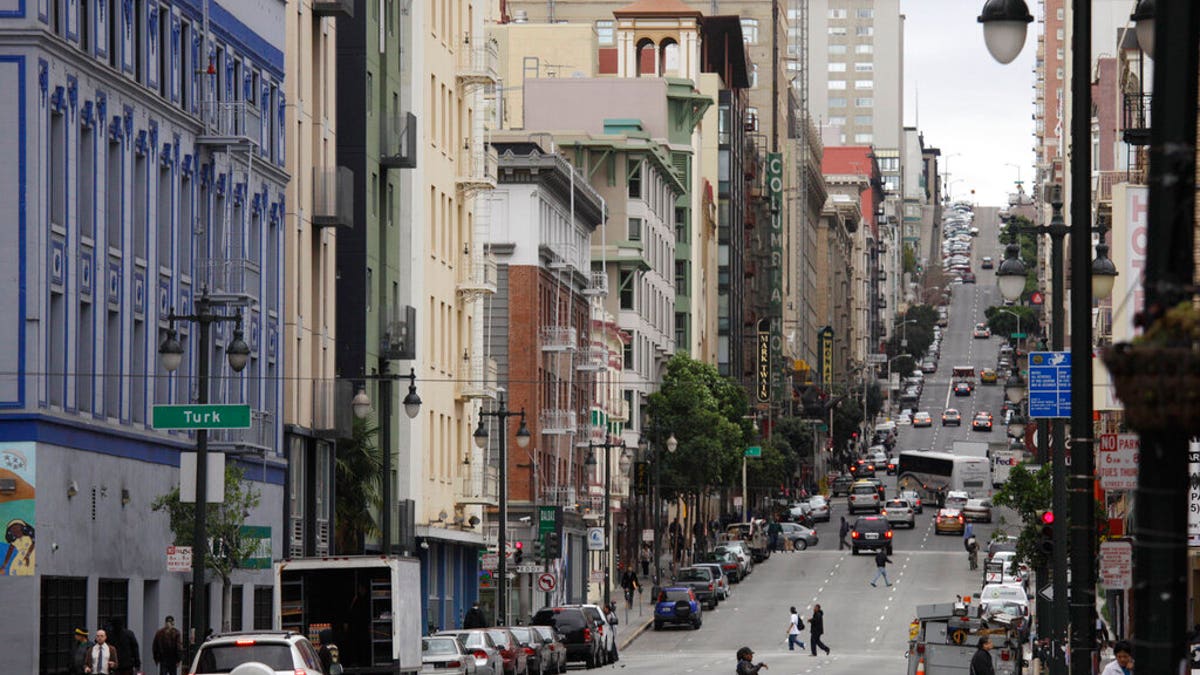Californians will vote next month on whether to approve the largest tax increase on commercial and industrial properties in more than 40 years, and the measure has sparked fierce debate on what its effect on small businesses and consumers will be.
The measure, if passed, will overturn Proposition 13, which based state property taxes on the purchase price of the property, rather than its market value. Under that measure, property taxes could be raised no more than 2% each year.
Proposition 15 would upend all that for commercial and industrial properties as owners would be required to pay taxes based on current market values. The state nonpartisan Legislative Analyst’s Office estimates Prop 15 will increase property taxes between $8 to $12.5 billion annually.

FILE: A view looking up Taylor Street of the Tenderloin neighborhood in San Francisco. (AP)
Supporters argue that average Californians and small businesses owners have shouldered the high costs for too long and that major corporations shouldn’t receive the same tax benefits as homeowners.
"Prop. 15 closes corporate property tax loopholes so we can invest in small business tax cuts, essential workers, and students," Alex Stack, Communications Director for Schools & Communities First, told Fox News in a statement.
"The best return on investment we can make is bringing in those resources back into our local economies, at no cost to residents. Recent reporting revealed that these tax breaks end up benefiting out-of-state and even foreign entities, which is something we simply cannot afford at a time like this," Stack said.
Among Prop 15’s most high-profile supporters are Democratic presidential nominee Joe Biden and his running mate, Sen. Kamala Harris, D-Calif. The Yes on 15 campaign has received $7.1 million from the Chan Zuckerberg Initiative, the philanthropic organization backed by Facebook CEO Mark Zuckerberg and his wife, Priscilla Chan.
TAX HIKES IN CALIFORNIA ON NOVEMBER BALLOT IN MANY STATES AMID CORONAVIRUS ECONOMIC FALLOUT
But, opponents say that the tax increase would inevitably get passed on to small businesses and consumers -- at a time when the state is still reeling from the coronavirus pandemic.
"The pro side typically says, 'this is to close loopholes and make the really large property owners in the state pay their fair share.' And in fact, what it really does is it pushes an enormous tax burden onto small businesses and consumers at a time when those sectors in our state are under enormous pressure due to the pandemic and all the shutdowns and all the burdens that are facing consumers and businesses already," Jeff Burns, the immediate past president of the California Mortgage Bankers Association told Fox News.
"To pass something like this and hit them with an enormous tax hike during these times is the worst public policy we could have in this state right now," Burns said.
CLICK HERE TO GET THE FOX NEWS APP
Smaller businesses would have a longer transition to the higher taxes, while small businesses operated out of home would be exempt from the new law. Owners with less than $3 million in total property would be exempt altogether. The measure would take in 2022 and then be phased in over three years.






















